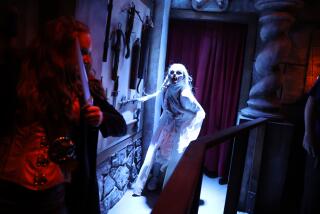Why the ‘Mummy’ reboot unraveled in the U.S. — and what it means for Universal’s monster plans

Tom Cruise, Russell Crowe, Annabelle Wallis and Sofia Boutella star in “The Mummy.”
Universal Pictures built its legacy with horror movies featuring Dracula, Frankenstein and the Wolf Man during the heydays of Boris Karloff and Bela Lugosi in the 1930s and ’40s.
More recently, the studio has made a well-publicized bet that it can create a series of successful films by bringing those creatures back from the dead.
But its long-gestating plan to transform old-school monsters into modern-day blockbusters hit a snag last weekend, as the big-budget Tom Cruise movie “The Mummy” flopped at the domestic box office. The weak opening underscores the challenges facing studios as they seek to revive old franchises for contemporary audiences that have more options than going to the multiplex.
“This is a brand they’re trying to create, and it’s a horrible start,” said Jeff Bock, a box-office analyst for Exhibitor Relations. “There is a learning curve, and that’s what Universal will probably write this off as.”
Studios have always relied on sequels and reboots to capitalize on the popularity of well-known material. But now entertainment companies are taking the concept further, creating “cinematic universes” made up of films with overlapping narratives and recurring characters that keep people coming back to the theaters and feed toy lines, video games and theme parks.
Walt Disney-owned Marvel Studios epitomized that strategy with a series of successful superhero movies that culminated in two “Avengers” films. Legendary Entertainment and Warner Bros. also have a MonsterVerse featuring King Kong and Godzilla.
“The Mummy,” which stars Sofia Boutella in the title role and Cruise as a soldier of fortune who must stop the ancient menace, is an uncharacteristic setback for the studio. Universal has had remarkable success in recent years building the “Fast and the Furious” franchise into a global juggernaut, restarting the “Jurassic World” property and creating a formidable animation output with “Despicable Me” producer Illumination Entertainment. The first three months of 2017 marked the most profitable first quarter in the studio’s history, with hits such as “Get Out” and “Fifty Shades Darker.”
“The Mummy” grossed just $31.7 million in the U.S. and Canada, though it did much better internationally. It collected $141.8 million from other countries, but that probably isn’t enough to justify a sequel. Two people familiar with the production said it cost $175 million to make.
Still, “The Mummy” is not expected to derail plans for upcoming monster movies in the studio’s so-called Dark Universe, which has been a key initiative for Donna Langley, who became chairwoman of the studio in 2013. Universal doesn’t have the rights to superheros the way Disney, Warner, Fox and Sony do. What it does have is a vault of classic monster movies that have been ingrained in American film culture for nearly a century.
Universal in May said director Bill Condon will make “Bride of Frankenstein” for 2019, after his previous film “Beauty and the Beast” from Disney grossed $1.24 billion globally. Johnny Depp and Javier Bardem have signed on to play the Invisible Man and Frankenstein’s monster, respectively, in future films. The studio is also expected to try to bring Dracula and the Wolfman back to the big screen.
Nick Carpou, president of domestic theatrical distribution for Universal Pictures, stressed that although the movies will have overlapping elements — including a secretive global organization that tracks, studies and sometimes destroys monsters — they do not depend on each other like the Marvel or DC movies.
“They each operate with their own identity and each has their own approach,” Carpou said. “They’re not dependent on previous films. In ‘Bride,’ there’s no reference to a Mummy character in the concept. There’s no plan to have them all team up and fight a bad guy.”
Bringing back the dusty monsters was always seen as a challenge. Some Hollywood executives questioned the wisdom of creating a universe of movies out of characters who are not traditional heroes. Unlike Warner and DC comic book heroes, the monsters haven’t shown much appeal in recent years. Attempted revivals such as 2014’s “Dracula Untold” and 2010’s “The Wolfman” underwhelmed at the box office, though analysts said the idea could still work if the movies were compelling.
“As a concept, it’s incredibly exciting,” said Paul Dergarabedian, senior media analyst at ComScore. “The trick is to make content that matches up to that ideal.”
A “Mummy” reboot had been in the works for years. Andres Muschietti, known for the horror movie “Mama,” was previously attached, but left in 2014 amid creative differences with the studio. Ultimately, directing duties went to Alex Kurtzman, known for scripting “Star Trek Into Darkness” and “The Amazing Spider-Man 2.” Kurtzman, who previously directed the low-budget film “People Like Us,” is one of the key creative minds in the development of the overall monsters universe, along with “Mummy” producer Chris Morgan.
Analysts blamed multiple factors for “The Mummy’s” struggles. The new film comes after the studio’s popular trilogy of movies starring Brendan Fraser that started in 1999, which many audiences still remember fondly for its goofy take on Egyptian horror. The previews, which emphasized Cruise’s death-defying stunt work, offered little that audiences hadn’t already seen in previous mummy movies or Cruise’s own “Mission: Impossible” franchise.
“They just finished a trilogy of mummy movies a decade ago, so there wasn’t much demand for a mummy movie, at least in the States,” said Shawn Robbins, chief analyst for BoxOffice.com.
Critics’ reviews were overwhelmingly negative and faulted the film for trying to do too much at the same time.
Crucially, the picture’s star, Cruise, doesn’t have the box-office draw in the U.S. that he once did. Recent movies including “Edge of Tomorrow” and “Jack Reacher: Never Go Back” performed tepidly stateside. Still, Cruise’s star remains bright for international audiences.
“Obviously, we always want to do the best gross we can and we were challenged domestically,” Carpou said. “But the film is terrific entertainment, and overall it’s going to be Tom [Cruise’s] biggest international opening of all time. The accumulation adds up to a box-office total we’re proud of.”
Now analysts are holding out hope that the Dark Universe will find its footing with “Bride of Frankenstein.” The studio had planned to release another undisclosed monster movie in 2018, but that was recently scrapped.
Previous attempts to rejuvenate film brands from the past have been derailed by early missteps, including Sony Pictures’ reboot of “Ghostbusters.” On the other hand, critics and fans can be won over. Warner Bros. bounced back from the critical drubbing of “Batman v Superman: Dawn of Justice,” which was criticized for its dark and brooding tone, with a nearly universally well-received “Wonder Woman,” which has been a major hit.
“All is not lost here,” Dergarabedian said of “The Mummy.” “They’re not going to abandon the Dark Universe after this.”
Times staff writers August Brown and Meredith Woerner contributed to this report.
ALSO
‘The Mummy’ is no match for the mighty ‘Wonder Woman’
Sofia Boutella calls her ‘Mummy’ character ‘the ultimate feminist’
Review: Tom Cruise’s best efforts can’t revive a chaotic reboot of ‘The Mummy’
More to Read
Inside the business of entertainment
The Wide Shot brings you news, analysis and insights on everything from streaming wars to production — and what it all means for the future.
You may occasionally receive promotional content from the Los Angeles Times.











